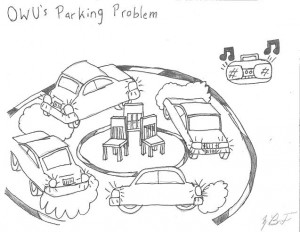
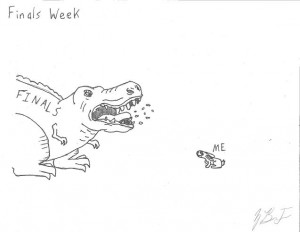
By: Ross Hickenbottom, Transcript Reporter
No more rolling deadlines, you say?
Ohio Wesleyan prospects, beginning with the class of 2020, will now have a new periodic deadline system to guide them with their college decisions.
Prior to the change, according to the OWU Admissions “Important Deadlines” section on the website, November 15 and 30, January 15 and 30, February 15, March 1, April 1 and May 1 were all listed as deadlines or notification dates, but a few are going to see changes.
The Ohio Wesleyan Admissions department has changed the admissions deadlines from having four deadlines, which were Early Decision in November; two Early Action deadlines, one in November and another in January; and a Regular Decision deadline in March. The Early Action deadline in November has been eliminated and the Early Action II in January has been kept. The Early Decision and Regular deadlines were not changed at all.
Susan Dileno, OWU Vice President for Enrollment Management, who replaced Interim VP for Enrollment Dave Wottle in August of last year, and the Admissions Department representatives said that while reviewing other private schools’ deadlines, particularly those in the Great Lakes College Association, they were “hardpressed to find a school with two early deadlines.”
Dileno said more typical is one of the two following scenarios: two Early Decisions and a Regular Decision deadline, or Early Decision, Early Action and Regular Decisions implemented.
She said OWU’s deadlines were out of norm, and she “felt it could be confusing to prospects and guidance counselors” of those prospects.
The benefit of the Admissions department eliminating the November Early Action date is that it provided an extra incentive for students to apply Early Decision if they wanted to get their decisions in November. In previous years, they could apply Early Decision or Early Action and learn of the decision in November under either plan.
“We did see a bump in our ED applications this year, so that is an added plus to OWU, since ED students are committing to attend if admitted,” Dileno said.
“I also think the later EA (Early Action) date serves our applicants well in that many students don’t find out about OWU until their senior year, and the later date gives them additional time to apply, while still giving them an option to learn of their decision before March,” she added.
By: Gopika Nair, Copy Editor
At Ohio Wesleyan University, the chill of December doesn’t dampen art.
Seven studio arts professors from OWU’s fine arts department created works for the “In Close Proximity” exhibition, which will run from Dec. 1 through Jan. 31 at OWU’s Ross Art Museum.
An artist reception was held on Dec. 3, which was open to students and faculty members. The exhibition features a variety of artistic media such as clay, metal, photography, printmaking, sculpture, painting, drawing and computer design.
Participating faculty members include Kristina Bogdanov, Cynthia Cetlin, Frank Hobbs, James Krehbiel, Justin Kronewetter, Jeff Nilan and Jonathan Quick.
Nilan, associate professor of fine arts, said the Ross Art Museum displays faculty members’ recent works every other year to share their works and research with the community.
“It’s a fact that we are engaged with our works in our studio and I think that breeds more effective and engaged teaching,” he said. “When we’re actively involved in doing things that we teach, I think that creates a more direct connection to what we’re [teaching] our students.”
Most of Nilan’s photographs that are on display at the exhibition were taken within the last two years, he said. The photos are also part of an ongoing project concerned with soft Western Iowa.
“I usually try to touch upon that project in every faculty biennial,” he said. “This time around, it was minimal.”
Instead, his primary focus was on landscape and figuring out how to perceive it.
Each faculty member explored something different in their pieces. Cynthia Cetlin, professor of fine arts, experimented in creating forms, patterns, textures and color by working with wool and silk, she said in her artist’s statement.
“I am fascinated with the repetitive technique of covering an entire fabric with closely hand-stitched rows that are pulled board-tight and knotted, then dyed or steamed,” she said.
In her statement, she described the process of preparing work for public view as “risky” as well as “inescapable and thrilling.”
“I am an ardent learner, always drawn to new techniques and to materials that are new to me. A constant in my life has been the desire to create body adornment and to develop knowledge and technical mastery.”
Sophomore Ellen Sizer said during the reception that the pieces that grabbed her attention were “Silver River of NymphsNaissos” and “Gold River of NymphsNaissos” by Kristina Bogdanov, an associate professor of fine arts.
Bogdanov said the pieces were inspired by her birthplace and the legend and folklore of Balkans.
Other pieces by Bogdanov include “6 Hours Difference Skype Conversations” and “Surreal Letters to my Sister.”
“In general, all of my work is inspired by my family,” Bogdanov said. “They are the inspiration and motivation, the provide me the experience and understanding of life and life values. Through the exploration of shapes, color, drawing marks or simply different materials, I try to visually communicate the stories related to my family or relationships within a family.”
Jillian Maruskin, a librarian at OWU, said during the reception that it’s important for faculty to showcase their work.
“They’re the ones teaching our students, and students have to feel like they have good mentors,” Maruskin said. “[Students can also] see what it’s like to be living, working artists.”
During the academic year, the Ross Art Museum is open Tuesday, Wednesday and Friday from 10 a.m. to 5 p.m.; Thursday from 10 a.m. to 9 p.m.; and Sunday from 1 p.m. to 5 p.m. Admission to the museum to view “In Close Proximity” is free.
By: Dr. Thomas Wolber
 Ohio Wesleyan University is justifiably proud of “the quality and accessibility of its faculty” (“Catalog” Introduction). Yet at the Nov. 16 faculty meeting, half a dozen duly elected members of the Wesleyan Council on Student Affairs and bona fide reporters from the student newspaper, The Transcript, were denied access to the deliberations of the faculty, which included several topics of direct relevance to students.
Ohio Wesleyan University is justifiably proud of “the quality and accessibility of its faculty” (“Catalog” Introduction). Yet at the Nov. 16 faculty meeting, half a dozen duly elected members of the Wesleyan Council on Student Affairs and bona fide reporters from the student newspaper, The Transcript, were denied access to the deliberations of the faculty, which included several topics of direct relevance to students.
Why was this unprecedented step taken? The conflict seems to have been triggered by Transcript stories appearing in the local newspaper, the Delaware Gazette. This has been happening for a while now and is rooted in a mutually beneficial arrangement between the two papers.
Transcript reporters see a wider distribution of their articles whereas Gazette readers receive information about OWU from student insiders. However, the arrangement meant that the monthly faculty meetings had become a public media venue, which was not to the liking of some faculty members. Concerns over journalistic standards and misrepresentations were voiced and privacy issues were raised. Primarily, however, it seems that many faculty members were worried that the presence of the press may lead to a situation where free and open discussion about contentious and sensitive issues might be stifled.
And this is, in my mind, the crux of the matter. We live in uncertain times. Many colleges and universities in Ohio and elsewhere, both public and private, are experiencing tremendous difficulties.
Institutions have been shuttered or merged, departments and programs eliminated, and faculty positions frozen or cut. This is an era of retrenchment, austerity, and exigency, and there is widespread fear and anxiety about what the future will hold. Across the nation, the faculty’s social status and standard of living are eroding; their very survival is at stake. The status quo is no more, and there are worried conversations about what the new norm might be. What was radical and unthinkable only a few years ago, is now being openly discussed. Maybe the unnerved faculty, especially from more vulnerable disciplines and departments, are instinctively sensing that control is slipping through their fingers and that ugly battles and wars might be ahead of them.
Change is never easy, especially if you are not the one driving it. We know from history and politics what effects the experience of displacement, disempowerment, and dispossession can have. It can lead to heated arguments, imprudent statements, disregard for established norms and values, and raw hostility. In their bewilderment, people start looking for scapegoats for either they do not understand the real reasons for what is happening, or if they do they feel helpless against the inexorable forces of destiny.
I, for one, view the exclusion of WCSA and The Transcript from the last faculty meeting as just one such event. Neither the students nor the press are not the faculty’s adversary; they are their natural allies and partners. It would be a strategic error to alienate them. The current fissure between the faculty and the students is an unfortunate distraction and a false dichotomy. In addition, the measure has done considerable harm to the faculty’s and the institution’s reputation and may negatively impact student recruitment and donor giving in the future. Therefore, the faculty’s student exclusion act of 2015 must be rescinded. Elected WCSA students should be readmitted immediately. Then reasonable students, faculty, and administrators should sit together, start a constructive dialog, and negotiate a balanced accord that ensures The Transcript access to faculty meetings on the one hand while protecting and preserving legitimate faculty interests on the other. Perhaps the student newspaper is willing to voluntarily suspend the arrangement with the Delaware Gazette for faculty meetings only while leaving it intact in other areas? In any case, for people of good will there is always plenty of common ground to be found.
Soapbox articles are unique platforms in which any member of the OWU community can “get up on their soapbox” and discuss any issue in 400 to 1000 words. Soapbox articles can be submitted on owutranscript.com using the Submit Your Story link on the upper left.
Dr. Thomas Wolber is an associate professor of German at Ohio Wesleyan. He teaches all levels of German language, literature and civilization. In addition to those subjects, he specializes in comparative literature and environmental studies.
By: Brian Goldaber, Transcript Correspondent
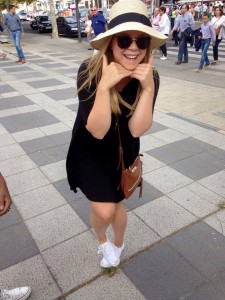
For a group of half a dozen Ohio Wesleyan students, the attacks in Paris on Nov. 13 were all too real. Six students spending a semester abroad in Salamanca were spending the week in Paris when the attacks occurred.
The students were stuck in Paris for two days after the attacks when France declared a state of emergency. During those two days the students would be put through something unlike anything they had ever experienced before.
“After the attacks I was in a serious state of shock. I couldn’t sleep because I kept having nightmares about my family and friends being there and dying. I couldn’t listen to music while I was walking down the street, I was paranoid,” junior Natalie Wynne said.
The itinerary for the study group was immediately canceled as the students spent most of their time in their hostel during their two days in the state of emergency. All of the students were able to contact their relatives and loved ones, but that did little to help with their anxiety.
“All of the news was in French so I couldn’t understand a single thing they were saying. It’s tough to explain what that does to a person. I’ve really never felt farther away from home,” Wynne said.
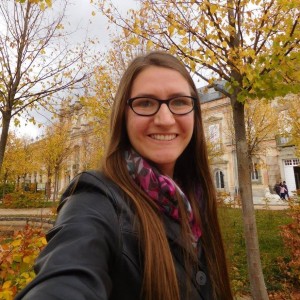
One junior, Jackie Everetts, was separated from the group on the night of the attack. She was able to safely find her way back to another hostel with a friend from her high school.
“Despite being separated from the group, I didn’t really feel scared. I guess it hadn’t hit me yet, everything that was going on. I just prayed for my safety and for all of those who were hurt,” Everetts said.
The attacks themselves included a series of coordinated suicide bombings and mass shootings that took place at cafes, restaurants and a music venue. The attackers killed 130 people and injured far more. ISIS has claimed responsibility for the attacks, saying it was retaliation for French airstrikes in ISIS-controlled territory.
France responded on Nov. 15 by launching its biggest aerial offensive in the country’s history. On Nov. 18, the suspected lead operative in the attacks, Abdelhamid Abaaoud, was killed in a police raid.
These attacks will linger in the minds of the Ohio Wesleyan students that were in France for the rest of their lives.
“Basically I don’t even have words to describe what happened and how I felt because it all felt like a dream to me until I left and got back to Salamanca safely,” said Wynne. “That’s when it really hit me what happened. I’ll never forget this. I guess you could call it life-changing.”
When the student guests arrived in Merrick Hall this Dec. 7, they were greeted by signs at the stairwells and elevators asking them to remain on the first floor.
A group of three faculty members waited downstairs with the students to relay messages about their admittance. After five minutes, the president and vice president of WCSA were allowed upstairs.
It took a half hour after this announcement before the reporter for The Transcript was permitted to join them.
The controversy over student presence at faculty meetings came to a head last month when faculty voted by a narrow margin to turn away student representatives from the Nov. 16 meeting out of concerns for privacy.
In the wake of that decision, articles about the meeting, first reported on by The Transcript, appeared in the Delaware Gazette and the Columbus Dispatch.
The publication of Transcript reports on faculty meetings in the Delaware Gazette, made possible by a sharing agreement between the two papers, initiated the three-month conflict. According to a campus-wide email signed by the Governance Committee, faculty were concerned that story sharing “could inhibit the frank and open discussion necessary in order to work through contentious issues.”
Other professors, namely professor Paul Kostyu of the journalism department, disagreed. And at the Dec. 7 meeting, while the motion to admit The Transcript reporter was still on the floor, Kostyu read a statement expressing his concerns.
Kostyu argued that “meetings shouldn’t be closed just because you think something might be said that you don’t like.”
After the faculty agreed to allow all students into the meeting, Provost Chuck Stinemetz announced that President Rock Jones was delayed in San Francisco and that there would be no administrative reports.
Professor Chris Wolverton, chair of the Governance Committee and a member of the department of botany and microbiology department, made remarks about the February board of trustees meeting. He said that it would be a “critical meeting” and that some faculty members might be asked to present information on their committee to members of the board.
Professor Dale Brugh of the chemistry department went on to present a proposed change to the wording of the faculty handbook. The amendment, which extends the deadline for those faculty applying for promotion, was approved.
Next at the podium was professor N. Kyle Smith, chair of the Academic Policy Committee and a member of the psychology department. Smith announced that his committee had approved a new math class, changes to politics and government course titles and numbers, and updates to the language of the existing academic catalog.
After a short reminder about the due date for final grades by professor Karen Poremski of the English department, the last meeting of the semester was adjourned.
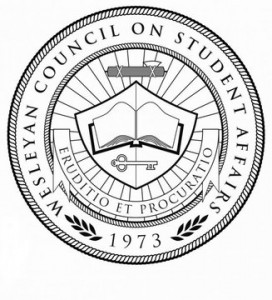
“This is it! Retirement is coming,” said President Jerry Lherisson, a senior.
The final full senate meeting of the semester for the Wesleyan Council on Student Affairs (WCSA) was Dec. 7, and most discussion focused on the requested budget of one club.
Vice President Emma Drongowski, a senior, began by thanking the senators for their hard work this semester, adding that they don’t get paid and often don’t get credit.
“It’s pretty crazy to think about all that we’ve accomplished this year,” said Drongowski.
She asked senators to make a list of what they accomplished this semester and include two tasks they hope to accomplish next semester.
Secretary Lee LeBoeuf, a junior, updated the full senate on the state of composting.
“The reason we stopped composting is because the place in Delaware that took our composting is no longer doing so,” LeBoeuf said.
She added that there is now wireless printing in the Welch and Hayes computer labs.
Kimberlie Goldsberry, Interim Vice President of Student Affairs and WCSA adviser, reported that revisions to OWU’s pet policy are still being considered. Feedback about the policy has been gathered from members of the Interfraternity Council (IFC) and Small Living Unit (SLUs) moderators.
The feedback included a request for the pet policy to remain the same until the end of the semester or the school year.
Goldsberry noted that some change is expected for the spring semester. Changes that could eventually be made are requiring dog owners to cage their dogs whenever the dogs will be home without them and not allowing cats to roam houses when their owners aren’t home.
Goldsberry also reported the news of two babies recently born to faculty and staff members. Dr. Brandt, Associate Professor of Psychology, had a daughter born Dec. 1 and Leslie Melton, Director of Career Services, had her daughter Dec. 4.
Recently, the Administrative Policy Committee (APC) proposed revisions to WCSA’s constitution, and senators voted unanimously at the meeting to accept the revisions.
Conversation shifted to financial matters, and Treasurer Graham Littlehale, a junior, said 53 budgets for next semester have been reviewed.
Campus Programming Board (CPB ) and Faith and Justice Club requested the most money.
Littlehale explained that CPB’s funding request was for the spring’s annual Bishop Bash, which would feature a non-musical performer this year.
“Last year it was really well-attended,” Littlehale said. “A lot of the surrounding community came.”
He said the budget committee knows the performer CPB plans on bringing in and it is someone widely known, but they cannot yet say who the performer is.
Six clubs were not awarded any money they requested, though they can apply for supplemental funding in the spring. Five of the groups did not receive funds because they did not send representatives to mandatory budget training.
The budget committee denied the requested funding for the Pre-Law Club for a different reason.
Sam Schurer, a junior, said there have been issues with the group in the past because they are so closely affiliated with the Pre-Law department. He said the club’s budget was turned down last year and the problem was explained to club members.
“Here we are a year later and nothing has changed,” Schurer said.
He added that this year’s budget request was also a lot of money per student.
Lherisson, a member of Pre-Law Club, made an argument for the group and for the Moot Court trip the budget request was for, stating that some of the close affiliation with the Pre-Law department was due to the group’s adviser and that the Moot Court team performed very well when they competed last year.
A motion passed to separate out the Pre-Law Club’s budget request in order to vote on the other requests. All the other budget requests were approved.
Goldsberry suggested the Pre-Law Club receive written advice and instruction, and she urged the senators “to strike a balance” between supporting the group and its endeavors while also judiciously approving budget requests.
The budget committee will re-convene this week to further discuss the issue, taking into consideration the points made during the meeting.

I’m the kind of person who fixates on things. I definitely have an obsessive personality, so once I’m interested in something, I really don’t let go. And the same goes with albums. Rather, sections of albums.
Lately, I can’t stop listening to The Clash’s 1983 album, Sandinista! Actually, I can’t stop listening to the second disc. There are 36 songs on the album, which means I’ve been listening to the same 18 songs over and over again. Not that I mind.
When I try to listen to different music, I can’t get into it. I truly have no explanation as to why I’m so fixated on this section of the album. And Sandinista! isn’t the only culprit in this weird habit I have. For example, within the past few days, I can only listen to the second side of Bruce Springsteen’s The River. The first side? I mean, it’s good. But the second side is what is permanently on my mind.
These albums consume me. Not only is this the only music I can bear to listen to, these songs are permanently stuck in my head. I fall asleep with them circling my brain, and even before I open my eyes in the morning, they start yet again. Instead of doing schoolwork, I do research on the albums. I mean, I ultimately get my work done, but it just delays the process.
Fixation on specific parts of albums is definitely a weird thing, which I completely understand. I wish I had some sort of rationale or reason as to why this happens, but I definitely don’t. I know it will continue, I just want to know what album is next.
By: Nik Schiff, Transcript Correspondent
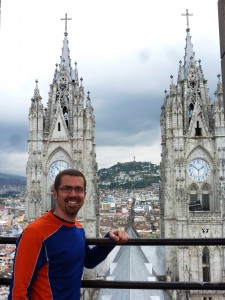
This summer, a group of Ohio Wesleyan students will find their spiritual testing ground in the Wyoming wilderness.
Members of the Leadership and Discipleship in the Wilderness (LDW) trip will spend six weeks in the Wind River Mountains beginning June 4.
Since 1995 the trip has been taken ten times; on average about every other summer. It is run by the Coalition for Christian Outreach, a campus ministry at OWU and other schools in the region.
Some activities offered include backpacking, rock climbing and mountaineering. The purpose of the excursion is to learn lifelong lessons through experiences rarely available to the average person, to provide opportunities for personal growth and maturation, and to develop personal faith.
“The potential for these things is huge if students can find the right places and contexts for this learning,” said William Hayes, associate chaplain and director of Wilderness Ministry at OWU.
“The experience of LDW makes it possible for students to learn in ways that are just not possible through campus.”
During the journey, students will receive personal Christian discipleship in the context of a close community, giving them the opportunity to grow in their faith and to make lifelong friends.
“I still keep in touch with some of the people I met whenever I went,” said Haley Barber, class of 2013. Barber attended the trip in 2012. “Having the opportunity to meet new people from different backgrounds was a great experience,” she said.
“My favorite part of the trip was all the nature and wilderness, it was gorgeous,” Barber continued.
The group will be able to rock climb and mountaineer. Mountaineering occurs over snow, ice and glaciers to heights up to 13,000 feet.
“These activities provide physical challenges with potential for failure but with high rewards,” Hayes said.
To date, only two students have applied to participate in this summer’s adventure to Wyoming.
By: Gopika Nair, Copy Editor

I love movies, I love television shows and I love the world of make-believe so much that I grew up wanting to be a part of it. But as a kid, I had the disappointing realization that none of the leading ladies in Hollywood were anything like me.
They were rarely Indian, and if they were, they probably had a thick accent for ill-suited comedic effect along with a storyline about arranged marriages.
As a woman of color, I’m tired of seeing these overused tropes, and I’m not alone. The actors are tired, too.
After Deadline reported on the casting of the film “Death Note” on Nov. 12, Arden Cho, known for her role as Kira Yukimura on “Teen Wolf,” tweeted, “Great, another Hollywood feature film casting all white leads for a Japanese manga … Long way to go for Asians when we can’t even book animes.”
Cho has previously been vocal about turning down roles which feature “superhot Asian trophy wives with thick accents,” and took to Twitter in 2014, requesting writers and filmmakers write better roles for Asian actors.

The lack of worthwhile roles in Hollywood isn’t a problem that’s exclusive to Asian actors, however. It affects all actors who are women of color.
On Sept. 20, Viola Davis became the first African American woman to win an Emmy Award for best actress in a drama.
In her acceptance speech, Davis addressed the lack of roles for women of color in the entertainment industry.
“The only thing that separates women of color from anyone else is opportunity,” she said. “You cannot win an Emmy for roles that are simply not there.”
Out of several hundred network shows currently on air, only “The Mindy Project” is created, produced and written by a woman of color, Mindy Kaling.
Even shows that promote diversity, like “Modern Family,” often rely on one of the character’s accent for humor.

Unlike some women of color in Hollywood, Sofia Vergara, who plays Gloria Delgado-Pritchett on “Modern Family,” isn’t faking her accent. But her character does get ridiculed by the other characters often.
In an interview with Cosmopolitan magazine, Vergara said that there aren’t many ideal roles for Latina women in Hollywood.
Many untold stories about the lives of women of color still exist. So, ditch the tropes, writers.
Find new stories to tell. Tell stories about transgender women of color, gender-fluid people of color, non-binary people of color, bisexual women of color, asexual women of color and women of color with disabilities.
Tell stories that will earn Asian, Middle Eastern, African American, Latina and other women of color their Oscars, Emmys and Tonys. Keep telling those stories until a woman of color winning a prestigious award isn’t a complete rarity. Representation matters.